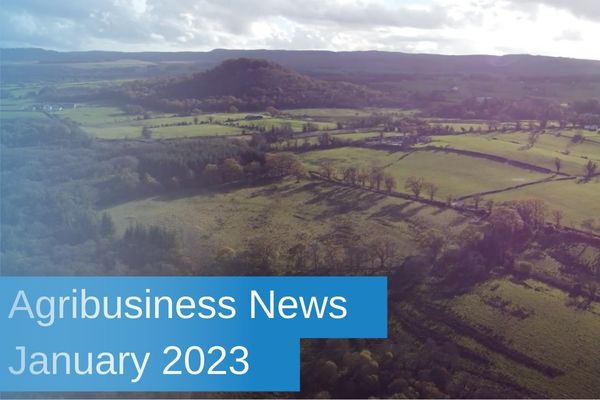Agribusiness News January 2023 – Carbon Roundup
22 December 2022Milestones throughout 2022
2022 has seen some major steps to advance strategies for carbon reduction across the agricultural sector. While action may be behind where is needs to be to reach targets, important groundwork has been laid for action going forward, and Scotland remains ahead in ambition of other regions of the UK and other ‘western’ nations.
The launch of the Scottish Taskforce for Green and Sustainable Financial Services brought together financial experts to begin problem solving challenges around carbon finance, and scale up investment flows to maximise both public and private money.
A related network, the Scottish Nature Finance Pioneers (SNFP), has built a community of experts and practitioners in Scotland, providing crucial knowledge sharing of novel approaches to natural capital investment. Linked to the network, NatureScot, the Esmée Fairbairn Foundation and the National Lottery Heritage Fund launched the Investment Ready Nature Scotland (IRNS) Grant Scheme in August, to help organisations and partnerships develop projects in Scotland that use private investment and market-based mechanisms to help finance the restoration of the natural environment.
Much work continues behind the scenes at a policy level to design a new system of payments to support agricultural activities. The global energy & cost of living crises has moved goalposts and priorities for public spending drastically over the year.
Funding for the implementation and training around soil testing under Preparing for Sustainable Farming (PSF) begins to mainstream soil carbon monitoring and recording, and the scope for emerging competitiveness of Scotland in this area. As data & technology develops, this will be increasingly accessible layer of knowledge to farmers around land and asset management.
What’s on the horizon?
The UK Farm and Soil Carbon Code (UKFSCC) has made significant progress throughout the year in advancing protocols that allow farmers to measure, record and verify (MRV) changes in soil carbon stock and GHG emissions as a result of adopting specific farming practices. In particular, a new framework is being created for carbon codes with Defra which will deal with the issue of variance in quality and specifics of requirements across carbon codes in practice in the UK and will be managed by an arms-length body.
Currently, the carbon codes verification process pays little attention to the details of MRV or specialist review for scientific rigour e.g. of soil testing methodologies. When implemented, this will be a major step forward in increasing the quality of carbon finance, a benefit to both potential sellers (farmers and land managers) and investors.
This sets the tone for the likely role of public funds in carbon credit generation & markets going forward. Governments are reluctant to play the role of a private market, compete with or undermine private investment; leveraging of private finance using a much smaller amount of public funds will be fundamental to achieve climate targets.
Policymakers are very aware of this, and to target public funding towards options/measures that the market won’t (e.g. soil testing and reporting, infrastructure, knowledge/expertise), or providing a carbon price guarantee (a forwards floor price guarantee to de-risk and leverage private investment with a return on investment of ~30 years), and schemes are being developed with this in mind.
The new Scottish Government Agriculture Bill, due in 2023, expects to set out priorities for targeting public money for carbon and natural capital outcomes.
Planning the year ahead
There is a lot of cautious talk about carbon markets and finance currently, and for good reason. However, there are things that businesses might explore and consider adopting as the norm going forward.
- While it is being funded, make sure you have a carbon baseline you can trust and explain which will provide solid evidence of any changes, required for future payments.
- If you are considering selling carbon credits at some point, think about how you might prove ‘additionality’ (i.e., that the action would not have been implemented without the carbon finance). There should be a paper trail ahead of implementation e.g., between the farm and advisor. Retrospective proof may not be valid.
- Start identifying potential interaction of carbon income streams with other forms of payments/ revenue e.g. biodiversity. ‘Stacking’ may be crucial for economic viability of measures on farm.
- Carbon markets bring together specialist areas of knowledge across agriculture, finance and carbon policy. Continually make the most of events and training opportunities, as the topic will evolve.
anna.sellars@sac.co.uk
Sign up to the FAS newsletter
Receive updates on news, events and publications from Scotland’s Farm Advisory Service

